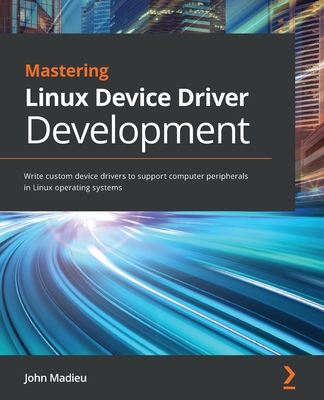Mastering Linux Device Driver Development: Write custom device drivers to support computer peripherals in Linux operating systems (Paperback)
暫譯: 精通 Linux 裝置驅動程式開發:撰寫自訂裝置驅動程式以支援 Linux 作業系統中的電腦周邊設備 (平裝本)
Madieu, John
- 出版商: Packt Publishing
- 出版日期: 2021-01-08
- 售價: $1,980
- 貴賓價: 9.5 折 $1,881
- 語言: 英文
- 頁數: 648
- 裝訂: Quality Paper - also called trade paper
- ISBN: 178934204X
- ISBN-13: 9781789342048
-
相關分類:
Linux
-
相關翻譯:
Linux 設備驅動開發 (簡中版)
立即出貨 (庫存 < 4)
買這商品的人也買了...
-
 人月神話:軟體專案管理之道 (20 週年紀念版)(The Mythical Man-Month: Essays on Software Engineering, Anniversary Edition, 2/e)
人月神話:軟體專案管理之道 (20 週年紀念版)(The Mythical Man-Month: Essays on Software Engineering, Anniversary Edition, 2/e)$480$379 -
 Managing Projects with GNU make, 3/e (Paperback)
Managing Projects with GNU make, 3/e (Paperback)$1,698$1,613 -
 Linux Device Driver Programming 驅動程式設計
Linux Device Driver Programming 驅動程式設計$690$587 -
 Debug Hacks 除錯駭客 -- 極致除錯的技巧與工具
Debug Hacks 除錯駭客 -- 極致除錯的技巧與工具$580$458 -
 $454編碼 -- 隱匿在電腦軟硬件背後的語言 (Code: The Hidden Language of Computer Hardware and Software)
$454編碼 -- 隱匿在電腦軟硬件背後的語言 (Code: The Hidden Language of Computer Hardware and Software) -
 PCI Express Technology 3.0 (dhl)
PCI Express Technology 3.0 (dhl)$3,980$3,900 -
 無瑕的程式碼-敏捷軟體開發技巧守則 + 番外篇-專業程式設計師的生存之道 (雙書合購)
無瑕的程式碼-敏捷軟體開發技巧守則 + 番外篇-專業程式設計師的生存之道 (雙書合購)$940$700 -
 透視 C語言指標-深度探索記憶體管理核心技術 (Understanding and Using C Pointers)
透視 C語言指標-深度探索記憶體管理核心技術 (Understanding and Using C Pointers)$480$379 -
 精通 Linux 內核網絡 (Linux Kernel Networking: Implementation and Theory)
精通 Linux 內核網絡 (Linux Kernel Networking: Implementation and Theory)$594$564 -
 The Linux Programming Interface 國際中文版 (上冊)
The Linux Programming Interface 國際中文版 (上冊)$800$632 -
 The Linux Programming Interface 國際中文版 (下冊)
The Linux Programming Interface 國際中文版 (下冊)$800$632 -
 Linux Device Driver Development (Paperback)
Linux Device Driver Development (Paperback)$1,940$1,843 -
 Embedded Linux Development using Yocto Project Cookbook, 2/e (Paperback)
Embedded Linux Development using Yocto Project Cookbook, 2/e (Paperback)$1,980$1,881 -
 為你自己學 Git
為你自己學 Git$500$425 -
 駭客的 Linux 基礎入門必修課 (Linux Basics for Hackers: Getting Started with Networking, Scripting, and Security in Kali)
駭客的 Linux 基礎入門必修課 (Linux Basics for Hackers: Getting Started with Networking, Scripting, and Security in Kali)$420$357 -
 軟體架構原理|工程方法 (Fundamentals of Software Architecture: A Comprehensive Guide to Patterns, Characteristics, and Best Practices)
軟體架構原理|工程方法 (Fundamentals of Software Architecture: A Comprehensive Guide to Patterns, Characteristics, and Best Practices)$680$537 -
 Linux 設備驅動開發
Linux 設備驅動開發$894$849 -
 Linux Kernel Programming Part 2 - Char Device Drivers and Kernel Synchronization: Create user-kernel interfaces, work with peripheral I/O, and handle
Linux Kernel Programming Part 2 - Char Device Drivers and Kernel Synchronization: Create user-kernel interfaces, work with peripheral I/O, and handle$1,580$1,501 -
 練核心從裡強到外:全面了解 Linux 基礎架構
練核心從裡強到外:全面了解 Linux 基礎架構$1,000$790 -
 大師功力再昇華:實作 Linux 核心偵錯及實戰演練
大師功力再昇華:實作 Linux 核心偵錯及實戰演練$880$748 -
 大師養成起手式:從核心真正了解 Linux 運作原理
大師養成起手式:從核心真正了解 Linux 運作原理$880$695 -
 內行人才知道的系統設計面試指南
內行人才知道的系統設計面試指南$580$458 -
 Linux Device Driver Development : Everything you need to start with device driver development for Linux kernel and embedded Linux, 2/e (Paperback)
Linux Device Driver Development : Everything you need to start with device driver development for Linux kernel and embedded Linux, 2/e (Paperback)$1,980$1,881 -
 $1,440Linux Kernel Debugging: Leverage proven tools and advanced techniques to effectively debug Linux kernels and kernel modules (Paperback)
$1,440Linux Kernel Debugging: Leverage proven tools and advanced techniques to effectively debug Linux kernels and kernel modules (Paperback) -
 Linux 設備驅動開發
Linux 設備驅動開發$894$849
商品描述
Master the art of developing customized device drivers for your embedded Linux systems
Key Features:
- Stay up to date with the Linux PCI, ASoC, and V4L2 subsystems and write device drivers for them
- Get to grips with the Linux kernel power management infrastructure
- Adopt a practical approach to customizing your Linux environment using best practices
Book Description:
Linux is one of the fastest-growing operating systems around the world, and in the last few years, the Linux kernel has evolved significantly to support a wide variety of embedded devices with its improved subsystems and a range of new features. With this book, you'll find out how you can enhance your skills to write custom device drivers for your Linux operating system.
Mastering Linux Device Driver Development provides complete coverage of kernel topics, including video and audio frameworks, that usually go unaddressed. You'll work with some of the most complex and impactful Linux kernel frameworks, such as PCI, ALSA for SoC, and Video4Linux2, and discover expert tips and best practices along the way. In addition to this, you'll understand how to make the most of frameworks such as NVMEM and Watchdog. Once you've got to grips with Linux kernel helpers, you'll advance to working with special device types such as Multi-Function Devices (MFD) followed by video and audio device drivers.
By the end of this book, you'll be able to write feature-rich device drivers and integrate them with some of the most complex Linux kernel frameworks, including V4L2 and ALSA for SoC.
What You Will Learn:
- Explore and adopt Linux kernel helpers for locking, work deferral, and interrupt management
- Understand the Regmap subsystem to manage memory accesses and work with the IRQ subsystem
- Get to grips with the PCI subsystem and write reliable drivers for PCI devices
- Write full multimedia device drivers using ALSA SoC and the V4L2 framework
- Build power-aware device drivers using the kernel power management framework
- Find out how to get the most out of miscellaneous kernel subsystems such as NVMEM and Watchdog
Who This Book Is For:
This book is for embedded developers, Linux system engineers, and system programmers who want to explore Linux kernel frameworks and subsystems. C programming skills and a basic understanding of driver development are necessary to get started with this book.
商品描述(中文翻譯)
掌握為嵌入式 Linux 系統開發自訂裝置驅動程式的藝術
主要特色:
- 了解 Linux PCI、ASoC 和 V4L2 子系統,並為其撰寫裝置驅動程式
- 熟悉 Linux 核心的電源管理架構
- 採用實用的方法,使用最佳實踐自訂您的 Linux 環境
書籍描述:
Linux 是全球增長最快的作業系統之一,近幾年來,Linux 核心已顯著演變,以支持各種嵌入式設備,並改進了子系統和一系列新功能。通過本書,您將了解如何提升您的技能,為 Linux 作業系統撰寫自訂裝置驅動程式。
《掌握 Linux 裝置驅動程式開發》全面涵蓋核心主題,包括通常未被提及的視訊和音訊框架。您將與一些最複雜且影響深遠的 Linux 核心框架合作,例如 PCI、針對 SoC 的 ALSA 和 Video4Linux2,並在過程中發現專家提示和最佳實踐。此外,您將了解如何充分利用 NVMEM 和 Watchdog 等框架。一旦您熟悉了 Linux 核心輔助工具,您將進一步處理特殊裝置類型,例如多功能裝置 (MFD),然後是視訊和音訊裝置驅動程式。
在本書結束時,您將能夠撰寫功能豐富的裝置驅動程式,並將其整合到一些最複雜的 Linux 核心框架中,包括 V4L2 和針對 SoC 的 ALSA。
您將學到的內容:
- 探索並採用 Linux 核心輔助工具以進行鎖定、工作延遲和中斷管理
- 理解 Regmap 子系統以管理記憶體存取並與 IRQ 子系統合作
- 熟悉 PCI 子系統並為 PCI 裝置撰寫可靠的驅動程式
- 使用 ALSA SoC 和 V4L2 框架撰寫完整的多媒體裝置驅動程式
- 使用核心電源管理框架構建具電源感知的裝置驅動程式
- 了解如何充分利用 NVMEM 和 Watchdog 等雜項核心子系統
本書適合對象:
本書適合嵌入式開發人員、Linux 系統工程師和系統程式設計師,想要探索 Linux 核心框架和子系統。具備 C 語言程式設計技能和基本的驅動程式開發理解是開始本書的必要條件。








